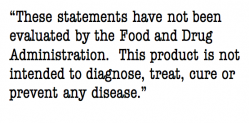Medical foods guidance could open avenues for dietary supplement disease claims, attorney asserts

In a post on the firm’s blog site, Arhangelsky makes an argument based on FDA’s somewhat surprising exclusion in the revised draft guidance of certain diseases from eligibility as conditions for which a medical food can be formulated and marketed. The agency specifically excluded type 1 and type 2 diabetes, saying that these are diseases that do not give rise (either through direct disease mechanisms or as a result of drug treatments) to the sort of nutritional deficiencies that a medical food might address. Rather, to use the agency’s words, “because such diseases can typically be managed through dietary modification alone, FDA generally would not consider a product labeled and marketed for these diseases to meet the regulatory criteria for a medical food.”
Room for disease claims?
So, if a medical food can’t play in this space, but dietary modifications can, why couldn’t a dietary supplement (a subcategory of food, after all), tout its efficacy in helping make these dietary modifications successful?
“If FDA will not allow medical foods to address those conditions because changes in diet can remedy the deficiency, then surely dietary supplements should be allowed to advertise the benefits of certain products in correcting deficiencies. After all, FDA just told us that these ‘diseases’ can be managed by changes to dietary intake. Many medical food products can theoretically be reformulated or relabeled as dietary supplements without a significant interruption in sales,” Arhangelsky wrotes.
In the draft guidance, the agency also revisited the definition of a nutrient deficiency disease, using scurvy and pellagra as examples of “classical nutrient deficiency diseases.” While it can be inferred that what was meant here (the draft guidance language parrots the language in the enabling statute) are those nutrient deficiency diseases that were identified as a result of the discovery of the various vitamins and their role in human health, Arhangelsky maintains that the word “classical” as used here is undefined, giving FDA scope to determine what does and doesn’t qualify as one of these diseases.
New set of qualified health claims
Renewed discussion on the topic of nutrient deficiency diseases raises the question of whether a set of qualified health claims could be set up for these conditions, Arhangelsky wrote. “Companies seeking to rely on the Section 343(r)(6) exemption would, at minimum, need to prove through credible science that the nutrient deficiency is the exclusive cause of a disease in order to assert the exemption,” he wrote.
“Medical food companies left scrambling after FDA’s draft guidance should also consider whether dietary supplement health claims or qualified health claims could provide patients with critical information outside of the medical food context,” Arhangelsky added.
Rigid categories seen as untenable
The debate about the new features of the revised medical food draft guidance points out what to Arhangelsky is the increasingly untenable nature of FDA’s regulatory stance in regards to the benefits of dietary supplements. Certain avenues of research—into the benefits of probiotic organisms, for example—are already being restricted by the need to fit into rigidly defined regulatory spheres. The attempt to narrow the penumbras surrounding those spheres runs counter to the tide of much of modern medical thought, Arhangelsky wrote.
“Will the FDA’s system of censorship based on rigid, mutually exclusive categories (e.g., “drug,” “dietary supplement,” “medical foods”) remain practical as medicine evolves?” he wrote.
Click here to read Arhangelsky’s full blog post.

















